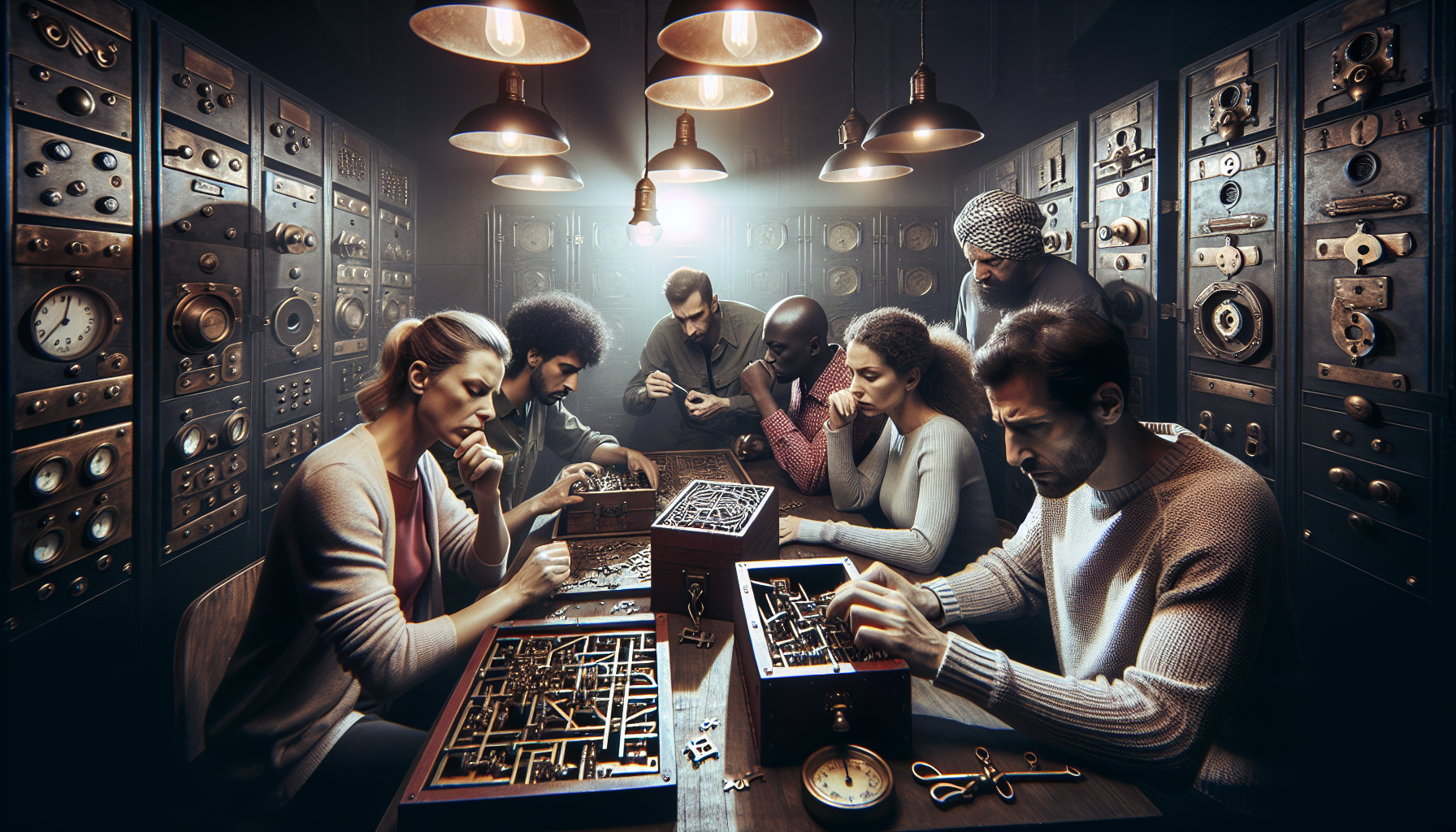Do you ever wonder if an escape room is actually an IQ test in disguise? It’s a question that has intrigued many, as these immersive experiences challenge you to solve puzzles and think critically under pressure. In this article, we’ll explore the relationship between escape rooms and IQ, and whether these challenging adventures truly measure intelligence or are simply a fun way to test your problem-solving skills. So, get ready to enter the mysterious world of escape rooms and discover if your IQ truly shines in these thrilling tests!
What is an escape room?
An escape room is a popular recreational activity that presents participants with a series of challenges and puzzles to solve within a limited time frame. This immersive experience typically takes place in a themed room where players must use their wits, teamwork, and problem-solving skills to find hidden clues, decipher codes, and unlock various locks and mechanisms in order to “escape” from the room. Escape rooms have gained immense popularity in recent years as a fun and engaging way to test one’s mental abilities while having a great time with friends or family.
The concept of IQ tests
IQ tests, on the other hand, are commonly used assessments that aim to measure a person’s intelligence quotient (IQ). Developed in the early 20th century, these tests evaluate various cognitive abilities such as logical reasoning, problem-solving, verbal comprehension, and spatial awareness. IQ tests are often used by psychologists, educators, and employers to understand an individual’s intellectual potential and to make informed decisions regarding education, employment, and other related matters.

Similarities between escape rooms and IQ tests
Time constraint challenges
Both escape rooms and IQ tests involve time constraint challenges. In an escape room, participants are usually given a specific time limit, often one hour, to solve all the puzzles and escape from the room. This creates a sense of urgency and adds an element of excitement and pressure to the experience. Similarly, IQ tests are timed assessments where individuals must complete a series of questions within a specified time frame. This shared element of time constraint adds a level of challenge to both escape rooms and IQ tests, requiring participants to think quickly and make efficient use of their time.
Problem-solving and logical thinking
Another notable similarity between escape rooms and IQ tests is the emphasis on problem-solving and logical thinking. In an escape room, players encounter a variety of puzzles that require them to analyze information, think critically, and apply logic to find solutions. Similarly, IQ tests often include questions that require individuals to identify patterns, make connections, and solve complex problems using their analytical and logical reasoning abilities. Both activities put participants in situations where they must think outside the box, assess different possibilities, and devise effective strategies to overcome challenges.
Multiple intelligence factors
Escape rooms and IQ tests also assess multiple intelligence factors. In an escape room, participants may be confronted with tasks that test their linguistic intelligence (decoding written messages), logical-mathematical intelligence (solving numerical puzzles), spatial intelligence (navigating a physical space), and interpersonal intelligence (working effectively in a team). Similarly, IQ tests aim to evaluate a range of cognitive abilities, including verbal and mathematical reasoning, spatial awareness, and memory. This overlap in assessing various intelligence factors highlights how both escape rooms and IQ tests provide individuals with opportunities to showcase their strengths and abilities in different areas of intelligence.
Assessment of cognitive abilities
Both escape rooms and IQ tests serve as assessments of cognitive abilities. Escape rooms assess participants’ cognitive skills by challenging their memory, attention, problem-solving, and decision-making abilities. By observing how individuals tackle puzzles and work together as a team, escape room facilitators can gain insights into their cognitive strengths and weaknesses. In the same vein, IQ tests provide a standardized method of evaluating an individual’s cognitive abilities across different domains. By measuring performance in specific areas, IQ tests can offer an understanding of an individual’s overall intellectual potential and cognitive capacity.
Differences between escape rooms and IQ tests
Teamwork and collaboration
One key difference between escape rooms and IQ tests lies in the emphasis on teamwork and collaboration within escape rooms. In an escape room, participants must work together, leveraging each other’s strengths, and communicating effectively to solve puzzles and escape successfully. The collaborative nature of escape rooms promotes the development of teamwork skills, such as effective communication, cooperation, and division of tasks. On the other hand, IQ tests are typically completed individually, without any requirement for collaboration. This difference highlights how escape rooms offer a unique opportunity to assess and foster teamwork skills, which are invaluable in real-world scenarios.
Emphasis on real-life skills
Escape rooms often aim to simulate real-world scenarios, where participants must use their problem-solving skills and logical thinking in a practical context. The puzzles and challenges in escape rooms are designed to reflect real-life situations, requiring individuals to draw upon skills and knowledge they would encounter in their daily lives. On the contrary, IQ tests focus solely on assessing cognitive abilities in a standardized manner, devoid of real-life context. This disparity between escape rooms and IQ tests underscores the practical applicability of escape rooms, as they encourage the development of skills that are directly transferable to real-world situations.
Subjective nature of escape rooms
Escape rooms, by their very nature, are subjective experiences. The success or failure of participants in an escape room depends on various factors, including their approach to problem-solving, ability to work well under pressure, and even their personal preferences. Different teams may approach the same escape room in vastly different ways, leading to differing outcomes. This subjective aspect of escape rooms makes them highly personalized experiences, where individuals can showcase their unique strengths and perspectives. In contrast, IQ tests follow a standardized format and scoring system, aiming to provide an objective measure of cognitive abilities. The standardized nature of IQ tests ensures consistency in the assessment process, thereby enabling comparisons across individuals.
IQ tests as standardized measures
IQ tests, as standardized measures of intelligence, offer a level of objectivity and reliability that escape rooms cannot replicate. By adhering to strict guidelines and norms, IQ tests ensure that individuals are evaluated on an even playing field, minimizing the influence of subjective factors. This standardized approach allows for meaningful comparisons between individuals, providing insights into their intellectual capabilities and potential. While escape rooms offer a unique and engaging platform to showcase one’s abilities, they cannot provide the same level of objectivity and standardization afforded by IQ tests.

Escape rooms as mental challenges
Complex puzzles and riddles
Escape rooms are known for their complex puzzles and riddles. Participants may encounter a wide range of challenges, such as deciphering codes, solving cryptic puzzles, assembling objects, or manipulating intricate mechanisms. These mentally stimulating tasks require individuals to think critically, use deductive reasoning, and exercise their creative problem-solving abilities. The complexity of the puzzles in escape rooms ensures that participants are engaged and thoroughly tested in their mental capabilities, promoting cognitive growth and development.
Adaptive difficulty levels
Escape rooms often feature adaptive difficulty levels to cater to a wide range of participants and skill levels. This adjustable difficulty ensures that the experience remains challenging yet achievable for different groups of players. Escape room designers carefully curate the progression of puzzles, gradually increasing the difficulty as participants navigate through the room. This adaptive approach allows individuals to stretch their cognitive abilities without feeling overwhelmed, promoting a sense of accomplishment and satisfaction upon successfully solving the puzzles.
Intellectual stimulation
Escape rooms provide a unique opportunity for intellectual stimulation. The combination of time pressure, complex puzzles, and the need for critical thinking creates a mentally stimulating environment. Engaging in an escape room challenges individuals to think outside the box, explore new problem-solving strategies, and exercise their cognitive abilities in a fun and interactive setting. This intellectual stimulation not only fosters cognitive growth but also enhances individuals’ ability to think creatively and develop effective solutions, both inside and outside the escape room.
The role of IQ in escape room success
IQ as a contributing factor
While escape rooms do not explicitly measure IQ, there is evidence to suggest that intelligence, as measured by IQ tests, can play a role in escape room success. Individuals with higher IQ scores may possess enhanced cognitive abilities, such as problem-solving skills, logical reasoning, and pattern recognition, which can give them an advantage when faced with the challenges presented in escape rooms. Higher IQ individuals may be more adept at quickly processing information, identifying relevant clues, and making connections between disparate elements. However, it is important to note that escape rooms also require a diverse range of skills, and IQ alone does not guarantee success.
Importance of other skills
While IQ may contribute to success in escape rooms, it is not the sole determinant. Escape rooms require a multitude of skills, including creativity, teamwork, communication, adaptability, and perseverance. These non-cognitive skills, often referred to as soft skills, are crucial for effectively navigating and solving the challenges within an escape room. A high IQ without these other skills may not translate into success, as the ability to collaborate, communicate, and think creatively is essential for maximizing the potential of one’s intelligence in this context. Thus, escape rooms provide a platform for individuals to develop and showcase a wide array of skills beyond IQ.
Role of emotional intelligence
Escape rooms also offer an opportunity to explore and develop emotional intelligence. Emotional intelligence refers to the ability to recognize, understand, and manage one’s own emotions and the emotions of others. In an escape room, participants may experience a range of emotions, including frustration, excitement, and satisfaction. The ability to regulate and harness these emotions can significantly impact one’s performance and problem-solving abilities. Emotional intelligence can also enhance teamwork skills, as it enables individuals to navigate interpersonal dynamics, communicate effectively, and build strong relationships within the group. Thus, alongside IQ and other skills, emotional intelligence plays a crucial role in achieving success in escape rooms.

Debating the validity of escape rooms as IQ tests
Critics’ viewpoints
Some critics argue that escape rooms should not be viewed or used as a substitute for IQ tests. They believe that the complex puzzles and time constraints posed by escape rooms do not accurately reflect the broader cognitive abilities measured by standardized IQ tests. Unlike IQ tests, escape rooms lack the scientific rigor, standardization, and statistical reliability that are essential for valid assessment. Critics also argue that the subjective nature of escape rooms, influenced by personal preferences and team dynamics, makes it difficult to draw objective conclusions about an individual’s cognitive abilities based on their performance in an escape room.
Supporters’ viewpoints
On the other hand, supporters of escape rooms as IQ tests argue that these immersive experiences can provide valuable insights into an individual’s problem-solving abilities, critical thinking skills, and capacity to handle complex challenges within a given time frame. They believe that escape rooms offer a more practical and engaging way to assess cognitive abilities compared to traditional IQ tests. Supporters also highlight the potential benefits of escape rooms in identifying and nurturing talent in specific areas, such as lateral thinking, creativity, and teamwork, which may go beyond what IQ tests can capture.
The implications of viewing escape rooms as IQ tests
Potential benefits
Viewing escape rooms as IQ tests can have several potential benefits. Firstly, escape rooms promote a hands-on and experiential approach to assessing cognitive abilities, allowing individuals to actively engage in problem-solving tasks rather than simply answering test questions. This dynamic and interactive nature of escape rooms can make the assessment process more enjoyable and engaging for participants. Secondly, escape rooms can uncover hidden talents and strengths that may not be fully captured by traditional IQ tests. By showcasing a range of skills beyond IQ, escape rooms can provide a more holistic understanding of an individual’s abilities and potential. Lastly, escape rooms offer a unique platform for skill development, fostering creativity, teamwork, and critical thinking abilities that are applicable in various real-world scenarios.
Limitations and drawbacks
While there are potential benefits to viewing escape rooms as IQ tests, there are also limitations and drawbacks to consider. Escape rooms, as subjective experiences, may not provide a reliable and standardized measure of cognitive abilities. The influence of individual preferences, team dynamics, and external factors can impact participants’ performance, making it difficult to draw objective conclusions. Moreover, escape rooms may not assess all aspects of intelligence captured by traditional IQ tests, potentially overlooking certain cognitive abilities. Additionally, the lack of standardization and scientific rigor in escape rooms may limit their use as formal assessments in educational or employment settings.

Other factors to consider
Motivation and interest
Motivation and interest play a significant role in both escape rooms and IQ tests. Individuals who are motivated and interested in engaging in the challenges posed by escape rooms are more likely to invest their cognitive resources and perform better. Similarly, individuals who are motivated to perform well on IQ tests may approach the assessments with determination and focus, potentially impacting their scores. The presence of intrinsic motivation and genuine interest can enhance the overall experience and outcomes in both escape rooms and IQ tests.
Experience and familiarity
Experience and familiarity with escape rooms and IQ tests can also influence performance. Individuals who have prior experience with escape rooms may be more accustomed to the types of puzzles and challenges encountered, enabling them to navigate through the tasks more efficiently. Similarly, individuals who have previously taken IQ tests may have developed specific test-taking strategies and familiarity with the types of questions, giving them an advantage in subsequent assessments. However, it is important to note that experience and familiarity alone may not guarantee success, as each escape room and IQ test presents its unique set of challenges.
Contextual factors
Contextual factors, such as the specific escape room design or the nature of the IQ test, should also be taken into consideration when comparing escape rooms and IQ tests. Different escape rooms may vary in terms of complexity, theme, and intended difficulty level, making direct comparisons challenging. Similarly, IQ tests can differ in their content, format, and focus, which can impact the assessment outcomes. Recognizing the influence of contextual factors helps avoid generalizations and allows for a more nuanced understanding of the differences and similarities between escape rooms and IQ tests.
Conclusion
In conclusion, escape rooms and IQ tests share several similarities and differences. Both involve time constraint challenges, problem-solving, and the assessment of cognitive abilities. Escape rooms offer the added elements of teamwork, real-life skills, and subjective experiences, distinguishing them from IQ tests. While IQ can contribute to success in escape rooms, it is not the sole determinant, as other skills and emotional intelligence play crucial roles. The debate around viewing escape rooms as IQ tests highlights the potential benefits and limitations of this perspective. Escape rooms provide a unique and engaging platform for mental challenges, with their complex puzzles, adaptive difficulty levels, and intellectual stimulation. However, they may lack the standardization and scientific rigor required for formal IQ assessments. Ultimately, escape rooms offer an alternative approach to engaging individuals in problem-solving tasks and can provide valuable insights into their cognitive abilities and potential.

